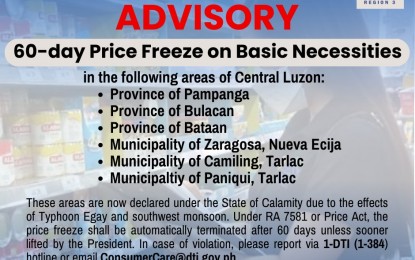
PRICE FREEZE. A price freeze is in effect in several areas of Central Luzon which were placed under a state of calamity effective Wednesday (Aug. 2, 2023). Under the Price Act, all basic goods are placed under a price freeze for 60 days, while prices of household liquefied petroleum gas (LPG) and kerosene shall be frozen for 15 days. (Infographic courtesy of DTI-Central Luzon)
CITY OF SAN FERNANDO, Pampanga – The Department of Trade and Industry (DTI-3) regional office here on Wednesday reminded business establishments and consumers in several areas of Central Luzon that were declared under a state of calamity to observe the price freeze.
Three provinces in the region -- Bataan, Bulacan and Pampanga -- and the municipalities of Camiling and Paniqui in Tarlac and Zaragosa town in Nueva Ecija were placed under a state of calamity in the aftermath of Super Typhoon Egay.
“A price freeze on basic necessities is now in effect in select areas in Central Luzon which were placed under a state of calamity. This is in response to the recent calamitous events caused by the southwest monsoon and Typhoon Egay in Central Luzon,” the DTI-3 said in its advisory.
Under Republic Act 7581, otherwise known as the Price Act, all basic goods are placed under a price freeze for 60 days, while prices of household liquefied petroleum gas (LPG) and kerosene shall be frozen for 15 days.
Considered as basic commodities are canned fish, locally manufactured instant noodles, bottled water, bread, processed milk, coffee, candles, salt, laundry soap and detergents.
DTI Regional Director Brigida Pili cited the need to implement a price freeze in times of calamity.
“The price freeze aims to stabilize the cost of basic necessities and prime commodities, ensuring that the essential items remain accessible to all consumers, especially those affected by the calamity,” Pili said in an interview.
Under the price freeze regulation, she said retailers and suppliers are prohibited from increasing the prices of basic necessities beyond their prevailing levels prior to the declaration of the state of calamity.
Pili said intensified monitoring is being conducted to serve as an important measure to combat any attempts to exploit market conditions.
“The monitoring activities involve regular inspections of retail stores, supermarkets and wet markets to ensure compliance with the price freeze regulations,” she added.
Meanwhile, the DTI official urged consumers to report retailers, distributors and manufacturers that sell basic goods above their prevailing prices by calling 1-DTI (1-384) or sending an email to [email protected].
Based on the latest report of the Regional Disaster Risk Reduction and Management Council (RDRRMC), a total of 583,145 families in Central Luzon were affected by the onslaught of Super Typhoon Egay and enhanced southwest monsoon.
Of the number, the RDRRMC data further showed that 10,730 families are still staying in 452 evacuation sites across the region. (PNA)
